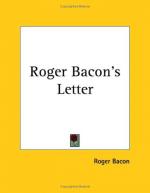|
This section contains 1,155 words (approx. 4 pages at 300 words per page) |

|
SOURCE: "Franciscan Schoolmen," in A History of Western Philosophy, and Its Connection with Political and Social Circumstances from the Earliest Times to the Present Day, Simon and Schuster, 1945, pp. 463-75.
A respected and prolific author, Russell was an English philosopher and mathematician known for his support of humanistic concerns. Two of his early works, Principles of Mathematics (1903) and Principia Mathematica (1910-13), written with Alfred North Whitehead, are considered classics of mathematical logic. His philosophical approach to all his endeavors discounts idealism or emotionalism and asserts a progressive application of his "logical atomism," a process whereby individual facts are logically analyzed. Regarding Russell, biographer Alan Wood states. "He started by asking questions about mathematics and religion and philosophy, and went on to question accepted ideas about war and politics and sex and education, setting the minds of men on the march, so that the world could never be quite...
|
This section contains 1,155 words (approx. 4 pages at 300 words per page) |

|


